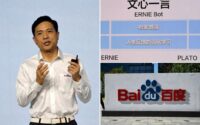Tesla stock soars after Elon Musk promises affordable EV
Tesla’s stock soared by more than 11% in pre-market trading early Wednesday morning after CEO Elon Musk said the company would accelerate the rollout of more affordable electric vehicles in hopes of boosting sagging profits.
Musk’s announcement was aimed at calming nervous investors on Wall Street who were still trying to digest the company’s most recent earnings report, released on Tuesday, that showed profit fell to its lowest in any three-month period since 2021.
Dan Ives, senior analyst at Wedbush Securities, said that Tesla and Musk “are facing a Category 5 storm after a Cinderella ride the last few years.”
But Ives added that he is maintaining a “bullish investment thesis” thanks to what he anticipates will be a “Model 2.5” — a lower cost Tesla that Musk indicated could hit the streets by early next year in a call with analysts.
Ives said the low-cost EV will be “key to the Tesla volume turnaround in 2025.”
Musk declined to provide details of the more affordable models and instead spent much of the earnings call on Tesla’s efforts to diversify its business into AI, humanoid robots and operating a fleet of autonomous vehicles — all based on software and hardware products it has not yet fully developed.
Several other analysts took Musk’s remarks that its cheaper models would be built using current platforms and production lines as a sign it had retreated from more ambitious plans for an all-new model that had been expected to cost $25,000.
“We read ‘more affordable’ as potentially de-contented Model Y/Model 3 versions with improvements in software and AI/hardware capability, but at lower prices,” Morgan Stanley analyst Adam Jonas said.
Tesla’s newly minted plans helped Wall Street shrug off the company’s weak first-quarter results. The stock has plummeted 42% since Jan. 1 as high borrowing costs have dampened demand for EVs and a price war in major market China intensified..
The company reiterated this week that it anticipates growth in 2024 to be “notably lower” than the previous year.
The EV pioneer said that its first quarter revenue dropped 9%, to $21.30 billion from $23.33 billion last year — the largest decline since 2012. Analysts were expecting the company to report revenues of $22.15.
In the fourth quarter of last year, Tesla reported revenue of $25.17 billion.
Tesla’s operating margin also shrank considerably in the first quarter — from 11.4% last year to just 5.5% in the first three months of this year.
Tesla reported net income of $1.1 billion in the period between January and March — down 55% from the same period last year.
Earlier this month, Tesla reported a steep 8.5% drop in the number of deliveries in the first quarter.
“First impression for us is CEO Elon Musk is appeasing the market by accelerating new product launches,” Jefferies analysts led by Philippe Houchois said in a note.
Tesla’s growth strategy could strengthen support for a shareholder vote in May on Musk’s $56 billion compensation package, which was voided by a Delaware court in January.
Some Tesla investors — such as Ross Gerber, president and CEO at Gerber Kawasaki Wealth & Investment Management — had said in recent days that they planned to oppose the package, citing a decline in Tesla’s share price and a compromised board.
Musk had previously said that he would aim to introduce the Model 2, a low-cost option that would be priced at around $25,000.
Last month, a Reuters report indicated that Musk ordered his lieutenants at the company to abandon plans for an affordable option and to focus instead on developing autonomous robotaxis. But the CEO denied the report, claiming that Reuters was “lying.”
The news agency responded by saying that it stood by its reporting.
On Tuesday, neither Tesla nor Musk directly addressed the Reuters report.
Instead, they discussed unidentified new models that appeared to be different products, without saying how many, what type or providing their target prices.
The new models would be built on Tesla’s current manufacturing lines and use “aspects” of its current platform and a next-generation platform, Tesla said.
It cautioned that this plan may “result in achieving less cost reduction than previously expected,” suggesting that the vehicles may cost consumers more than the Model 2’s anticipated $25,000 price.
Tesla has been in turmoil over the course of the past year as intense competition from Chinese companies such as the Warren Buffett-backed outfit BYD as well as a drop in demand for EVs that has eaten into its bottom line.
Two top executives at the company announced earlier this month that they would be departing.
Another, Martin Viecha, Tesla’s head of investor relations, said at the end of Tuesday’s earnings call that he would also be leaving his role.
Last week, the company said it would pause deliveries of all Cybertrucks after drivers complained of a potentially fatal flaw with the accelerator pedal.
The EV maker also announced that it had slashed prices in a number of its major markets, including China and Germany.
Over the weekend, Tesla cut the price of its Full Self-Driving driver assistant software to $8,000 from $12,000 in the US.


